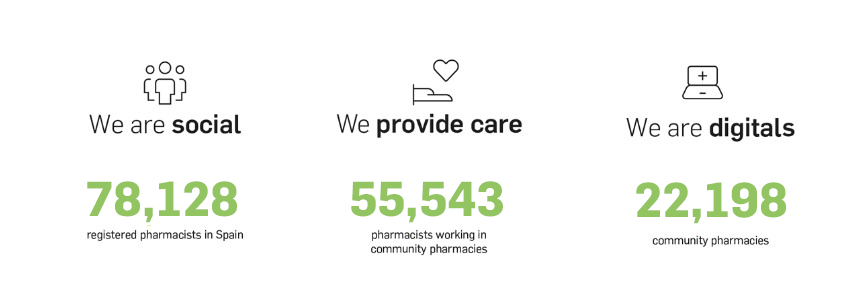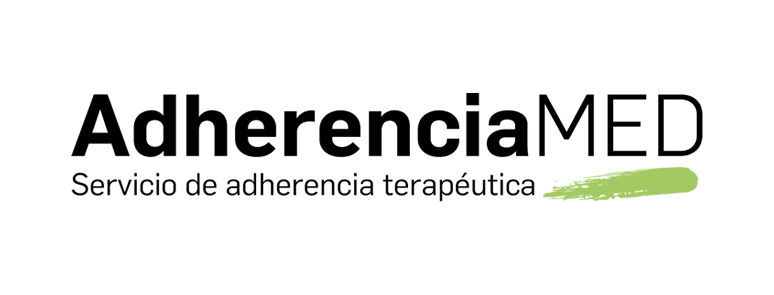Key figures
In Spain, 78,128 pharmacists are registered members of the 52 Provincial Pharmacists’ Chambers, 71.9% of whom are women and 43,3% of whom are under 44 years old. The vast majority of pharmacists, 88.5% of those who are active (55,543 pharmacists) work in one of the 22,198 community pharmacies, in which many of them also carry out work regarding the field of Nutrition, Dermatology or Orthopaedics (16.7%, 15.4% and 12.8% respectively)
Other significant professional fields stand out, such as Clinical Analysis and Hospital Pharmacy sections, with around 2,000 registered pharmacists each.
Pharmacists in Spain also work in Pharmaceutical Industry, Distribution, Optics and Acoustics, Public Health and Education and Research.
Due to their multidisciplinary training, university graduates in Pharmacy have one of the highest employability ratio upon completion of their studies.

Public Health Campaigns
Community Pharmacy
Definition and missions
The Degree in Pharmacy makes it possible to enter the job market in a wide range of professional opportunities. There are currently more than 55,000 community pharmacists in Spain, working as owners, co-owners, assistants, regents and substitutes.
Law 16/1997, of 25 April 1997, regulating the services provided by pharmacies, establishes that pharmacies are private health establishments of public interest, subject to the health planning established by the Autonomous Communities, in which the pharmacist-owner, assisted, where appropriate, by assistants or technicians, must provide the following basic services to the population:
- The acquisition, custody, storage and dispensing of medicinal products and medical devices.
- Monitoring, control and custody of the medical prescriptions dispensed.
- The guarantee of pharmaceutical care, in its pharmaceutical area, to population centres where there are no pharmacies.
- The preparation of pharmaceutical compounding and officinal preparations, in the cases and according to the established procedures and controls.
- Information and monitoring of pharmacological treatments for patients.
- Collaboration in the monitoring of the individualised use of medicines in order to detect adverse drug reactions (ADRs) that may occur and report them to the bodies responsible for pharmacovigilance.
- Collaboration in programmes promoted by the health administrations on quality assurance in pharmaceutical care and health care in general, health promotion and protection, disease prevention and health education.
- Collaboration with the health administration in training and information for other healthcare professionals and users on the rational use of medicines and medical devices.
- Coordinated action with the healthcare structures of the Health Services of the Autonomous Communities.
- Collaboration in teaching for the award of the degree of Bachelor of Pharmacy, in accordance with the provisions of Community Directives, and in the state and university regulations establishing the corresponding study plans in each one of them.
Royal Legislative Decree 1/2015, which approved the consolidated text of the Law on Guarantees and Rational Use of Medicinal Products and Medical Devices (Law 29/2006 of 26 July 2006) endorses the current pharmacy model, reiterating pharmacies as «private health establishments of public interest». It also incorporates the concept of Pharmaceutical Care, thus recognising the pharmacist’s role as a health agent.
The different regional laws on pharmaceutical regulation also establish the functions of pharmacies, incorporating new activities and strengthening the added value of Professional Pharmacy Services
Social Pharmacy
Value and Contribution
For some time now, and particularly during the last 15 years, the Spanish Pharmacy has been working to achieve a Pharmacy model that allows the maintenance of a service in line with the rest of the services provided by the National Health System.
The following data reflect the reality of the Community Pharmacy in Spain:
- The Spanish pharmacy is the closest and most accessible health setting to the citizen in comparison with other countries in our environment. 99% of the population has a pharmacy in their own municipality.
- Approximately 1 out of 4 pharmacies are located in rural areas and, more specifically, 3 out of 4 rural pharmacies are located in municipalities with less than 5,000 inhabitants.
- Spain is one of the European countries with the highest number of pharmacies per capita. In Spain, the number of inhabitants per pharmacy is around 2,200.
- Every day 1,500 pharmacies are on duty 24 hours a day in Spain to attend to the emergencies of the entire Spanish population.
- The current pharmaceutical system allows medicines to reach citizens in urban areas and in the most remote villages of Spain on equal conditions.
- Spending on medicines means that diseases that used to be treated in hospitals are now treated in outpatient clinics, with the consequent amortisation of hospital beds.
- Pharmacy is one of the services most highly valued by society. Complaints about pharmacy received by consumer organisations represent only 0.27%, while other services account for 14%.
- Every year, pharmacies offer 262 million health counselling not related with dispensing.
- The value of equivalent acts, a measure of the savings to the health system, reaches an annual level of over 1.7 billion euros.
Advancing Pharmacy
In the last decades, Pharmacy in Spain has evolved towards a patient focused approach. The General Pharmaceutical Council of Spain is committed to the development of strategies that allow the implementation of Professional Pharmacy Services and Pharmaceutical Care Services as the set of healthcare activities carried out by pharmacists.
Professional Pharmacy Services and Pharmaceutical Care ServicesOngoing projects
Concilia Medicamentos 2
The Concilia Medicamentos 2 research programme allows for the analysis of discrepancies and the estimation of the potential impact of pharmaceutical interventions after the implementation of the discharge reconciliation service. During hospital admissions it is likely that patients’ pharmacological treatments will be modified. To avoid omissions, duplication, interactions, etc., it is very important that pharmacists coordinate between care levels: community, primary care and hospital pharmacists. This care project aims to improve patient safety with regard to their medication and to conciliate their treatments after hospital discharge.
Find out moreHazFarma
 HazFarma initiative was created to follow-up the Strategic Plan for Pharmaceutical Care, maintaining the pillars that contributed to its success and providing a new qualitative leap for the Pharmaceutical Profession. In collaboration with Cinfa Laboratories, different actions are developed centered on the implementation of Professional Pharmacy Services in Community Pharmacy to protocolize training in services, provide high quality in healthcare and promote collaborative practice with other Pharmaceutical Services professionals.
HazFarma initiative was created to follow-up the Strategic Plan for Pharmaceutical Care, maintaining the pillars that contributed to its success and providing a new qualitative leap for the Pharmaceutical Profession. In collaboration with Cinfa Laboratories, different actions are developed centered on the implementation of Professional Pharmacy Services in Community Pharmacy to protocolize training in services, provide high quality in healthcare and promote collaborative practice with other Pharmaceutical Services professionals.
My Pharmacy (Mi Farmacia Asistencial)
Mi Farmacia Asistencial is a real patient-centred initiative of the General Pharmaceutical Council of Spain. As part of this real-world practice initiative, registered patients will be able to access their information on their medication and the results of their treatments from any participating pharmacy. Pharmacists will be able to deliver high quality personalised pharmacy services in order to achieve better health outcomes and better serve their patients.
As part of this real-world practice initiative, registered patients will be able to access their information on their medication and the results of their treatments from any participating pharmacy. Pharmacists will be able to deliver high quality personalised pharmacy services in order to achieve better health outcomes and better serve their patients.
Past projects
AdherenciaMED
 AdherenciaMED was a research program led by the General Pharmaceutical Council of Spain, in collaboration with the University of Granada and the University of Technology of Sydney. It was conducted in Community pharmacies to assess the clinical, economic and humanistic impact of a community pharmacist-led adherence service focused on improvement and reinforcement of adherence in patients urdergoing treatment for High-blood Pressure, Asthma or Chronic Obstructive Pulmonary Disease.
AdherenciaMED was a research program led by the General Pharmaceutical Council of Spain, in collaboration with the University of Granada and the University of Technology of Sydney. It was conducted in Community pharmacies to assess the clinical, economic and humanistic impact of a community pharmacist-led adherence service focused on improvement and reinforcement of adherence in patients urdergoing treatment for High-blood Pressure, Asthma or Chronic Obstructive Pulmonary Disease.
In 2020, AdherenciaMED was awarded by FIP as the programme that contributes to the improvement of the Pharmacy Practice.
Find out moreConSIGUE
ConSIGUE was a research programme to evaluate and develop a model for the implementation of the Medication Review with follow-up service (MRF) for elderly, patients with chronic diseases and with polypharmacy in community pharmacies.
The conSIGUE programme actioned in 3 phases is result of the collaboration with the University of Granada and the University of Technology of Sydney.
Find out moreEuropean project on shortages
Medicine shortages are a global and growing problem with a negative impact on citizens, healthcare systems and actors in the supply chain. This problem has worsened during the pandemic and has eventually paved the way for the European Commission to urgently develop a European Pharmaceutical Strategy. In this context, international cooperation is needed to prevent and mitigate the impact of this problem with complex and multifactorial causes. Pharmacy can once again be part of the solution to reduce the incidence of this lack of supply, through its systems for detecting and anticipating in real time the medicines unavailability.
Pharmacy can once again be part of the solution to reduce the incidence of this lack of supply, through its systems for detecting and anticipating in real time the medicines unavailability.





